自考高级英语上册词语辨析
- 格式:doc
- 大小:292.50 KB
- 文档页数:28
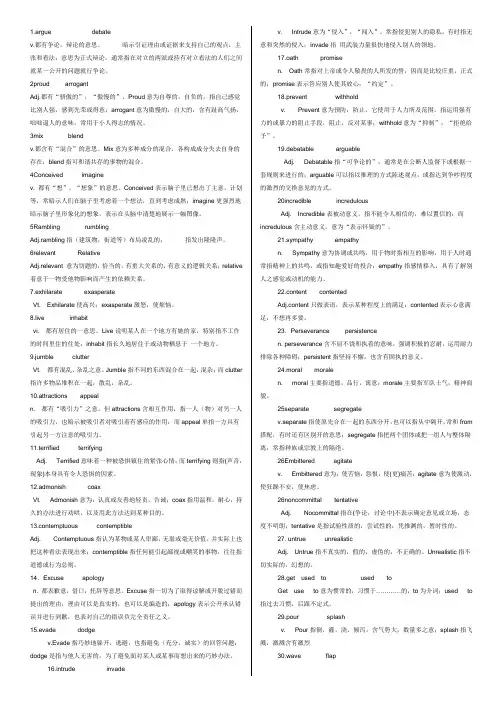
1.argue debatev.都有争论,辩论的意思。
暗示引证理由或证据来支持自己的观点,主张和看法;意思为正式辩论,通常指在对立的两派或持有对立看法的人们之间就某一公开的问题就行争论。
2proud arrogantAdj.都有“骄傲的”,“傲慢的”。
Proud意为自尊的,自负的,指自己感觉比别人强,感到光荣或得意;arrogant意为傲慢的,自大的,含有趾高气扬,咄咄逼人的意味,常用于小人得志的情况。
3mix blendv.都含有“混合”的意思。
Mix意为多种成分的混合,各构成成分失去自身的存在;blend指可和谐共存的事物的混合。
4Conceived imaginev. 都有“想”,“想象”的意思。
Conceived表示脑子里已想出了主意,计划等,常暗示人们在脑子里考虑着一个想法,直到考虑成熟;imagine更强烈地暗示脑子里形象化的想象,表示在头脑中清楚地展示一幅图像。
5Rambling rumblingAdj.rambling指(建筑物,街道等)布局凌乱的;指发出隆隆声。
6relevant RelativeAdj.relevant 意为切题的,恰当的,有重大关系的,有意义的逻辑关系;relative 着意于一物受他物影响而产生的依赖关系。
7.exhilarate exasperateVt. Exhilarate使高兴;exasperate激怒,使烦恼。
8.live inhabitvi. 都有居住的一意思。
Live说明某人在一个地方有她的家,特别指不工作的时间里住的住处;inhabit指长久地居住于或动物栖息于一个地方。
9.jumble clutterVt. 都有混乱,杂乱之意。
Jumble指不同的东西混合在一起,混杂;而clutter 指许多物品堆积在一起,散乱,杂乱。
10.attractions appealn. 都有“吸引力”之意。
但attractions含相互作用,指一人(物)对另一人的吸引力,也暗示被吸引者对吸引着有感应的作用;而appeal单指一方具有引起另一方注意的吸引力。
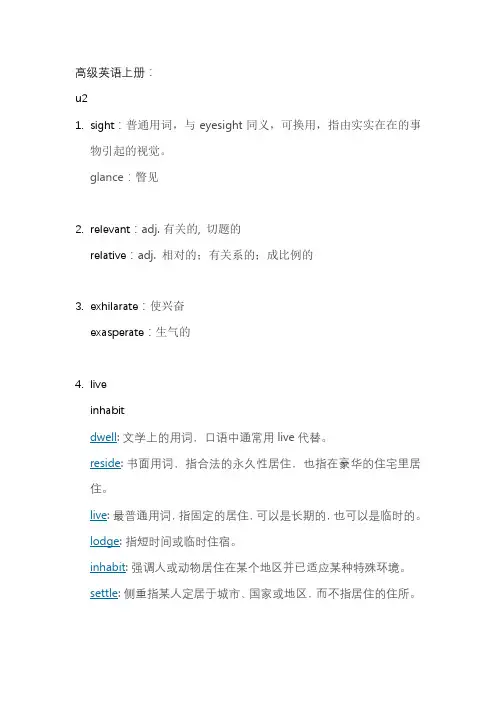
高级英语上册:u21.sight:普通用词,与eyesight同义,可换用,指由实实在在的事物引起的视觉。
glance:瞥见2.relevant:adj.有关的, 切题的relative:adj. 相对的;有关系的;成比例的3.exhilarate:使兴奋exasperate:生气的4.liveinhabit住。
5.wholesome:adj.有益健康的,多指能给人留下身体健康、思想健全或品德良好等印象。
noisome:adj. 恶臭的;有害的,令人不愉快的6.jumble:混杂;搀杂clutter:使凌乱;胡乱地填满eg:clutter sth up/withodds and ends:各种各样7.idealistic:理想主义的ideal:理想的;完美的;想象的;不切实际的8.attraction:吸引, 吸引力, 诱惑力appeal:呼吁,恳求;有吸引力,迎合爱好;诉诸,求助;上诉;(体育比赛中)诉诸裁判make appeal tou41.evade:规避(责任,问题)dodge:闪躲2.drowned out:淹没,压过stopped:停止3.intruding:强加,干涉,冒犯invading:侵略,侵袭,涌入4.omission:省略,疏忽exclusion:拒绝,排除5.oath:誓言promise:允诺,许诺6.preventing:预防withholding:扣留,不给予7.debatable:无法定论,很难说arguable:有待证实8.credible:adj. 可靠的,可信的believable:adj.令人信服的,逼真的u5:1.incredible:难以置信的incredulous:不肯相信的,表示怀疑2.tone:语调,声调tune,out of tune:跑调3.sympathy:同情empathy:移情4.vocation:职业,行业vacation:假期5.content,contented6.eliminate:消除,排除illuminate:点亮7.perseverance:坚持不懈,毅力,韧性persistence:固执己见8.moral:道德,寓意morale:士气u6:1.separate:分离,分裂segregate:隔离的2.embitter:苦恼的agitate:惹怒3.incredible:难以置信incredulous:不可置信4.noncommittal:不置可否地tentative:试探地5.untrue:不真实unrealistic:不现实6.intently:专注地tentatively:adv.试验性地;暂时地7.hesitant:犹豫地tentative:暂时地,试探地8.scoffed:嘲讽,嘲笑scold:批评,指责u7:1.get used to:习惯于used to:过去常常2.pour:倒;灌,注;倾吐;倾泻splash:使(液体)溅起splash some water3.wave:波动;起伏;摇动;呈波形;挥手示意wave a knife to threaten the people around him flap:焦急, 焦虑;(使)上下左右移动4.drift:漂流,漂移;漂流物;趋势,<水流>冲下来swoop:俯冲, 猛冲,猛扑;突然下降5.rescue:援救;营救;解救safe:挽救6.rub:擦;摩擦;惹怒stroke:弄胡须,轻抚,一击7.scrub:用力擦洗;使净化scrape:刮出刺耳声;刮掉8.make a point:立论;得一分;表明一种看法make a start:开始u8:1.remember:回想起来,记得memorize:记忆2.intolerant=not willing to accept ideasintolerance:无法容忍的3.infuse:灌注fill:装满,充满mon:共同的ordinary:普通的,寻常的5.familiar:熟悉的intimate:亲密的,亲近的6.happen:happen to sb,通常是不愉快的事情发生occur7.respectable:体面的respectful:充满尊敬的8.divide:分割分开separate:(夫妻)分句,断绝关系,独立u9:1.allot:vt.分配, 拨给, 摊派divide:分开;划分;除;使产生分歧2.mysterious:神秘的; 难以理解的miraculous:奇迹般的, 超自然的3.obtainable:可获得的;可取得的absorbable:可吸收的,容易被吸收的4.preeminent:卓越的;超群的prominent:杰出的, 著名的, 卓越的5.enhance:提高, 增加, 加强increase:增加, 增大, 增多6.dismissable:可驳回的disposable:一次使用后即丢掉的, 一次性的;(纳税后的钱)可自由支配的7.accompanied:陪伴,陪同company:公司;陪伴,同伴;连队8.reverse: (使)反转; (使)颠倒; (使)翻转adverse:不利的;相反的;敌对的u10:1.distribution:分发, 分配,散布allotment:分配,分派,拨款,(从军饷或海员薪水中扣除的)养家费2.contemptuous:蔑视的;鄙视的;表示轻蔑的contemptible:<正>可轻蔑的;可鄙的;卑劣的3.even:偶数的;(使)平; (使)相等equal:4.readable:可读的,有趣味的(书之类)legible:易读的,字迹清晰的,看得清的5.shameful:可耻的;不体面的;不道德的;猥亵的shameless:(人)无耻的, 不知羞耻的, 不要脸的6.quick:快速地abrupt:突然地7.grievance:委屈, 苦衷, 不满, 怨恨grief:悲伤, 悲痛8.daunt:vt. 使气馁,使畏缩;威吓discourage:使气馁; 使沮丧,劝阻u11:1.contrariness:n. 反对,矛盾,乖张contradiction:反驳,否认,矛盾2.dark:黑暗;黄昏;模糊;夜dim:1. adj. 模糊的,看不清的;暗淡的,昏暗的;悲观的,怀疑的2. vt. 使暗淡,使失去光泽;使变模糊3.abuse:1. v. 滥用;虐待;辱骂(abuse的三单形式)2. n. 滥用;虐待;暴行(abuse的复数)torment:折磨,使痛苦;纠缠,作弄4.induce:vt. 引诱;[电]感应;[医]诱导;引起tempt:引诱或怂恿(某人)干不正当的事5.wonder:1. n. 惊奇;奇迹;惊愕2. vi. 惊讶;怀疑;想知道meditate:1. vt. 考虑;计划;企图2. vi. 冥想;沉思6.literal:字面意义的;逐字的;无夸张的;文字的exact:精确的;准确的,精密的7.imaginary:想象的,虚构的imaginative:指想象大异于现实,近乎或等于虚构。
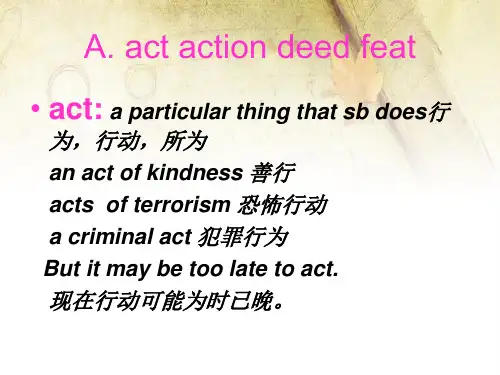
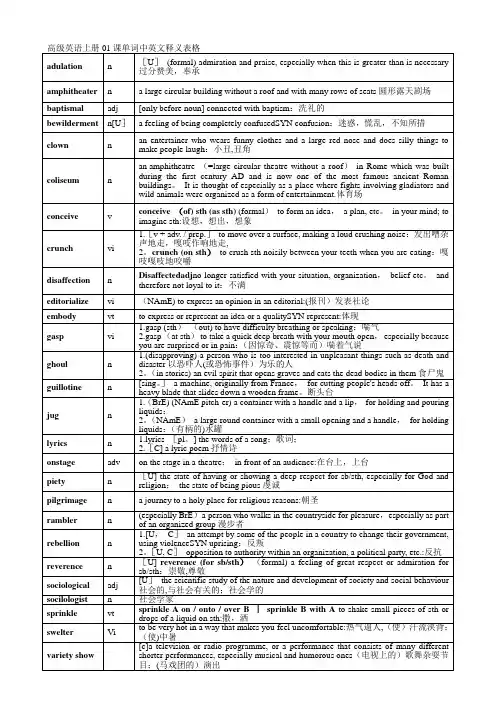
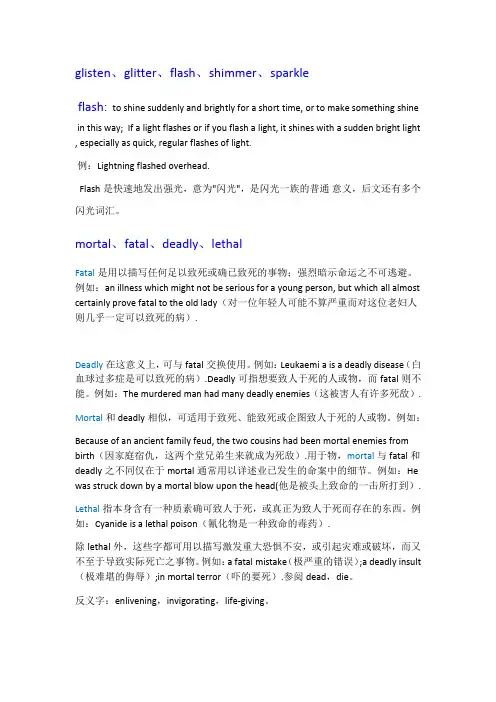
glisten、glitter、flash、shimmer、sparkleflash: to shine suddenly and brightly for a short time, or to make something shine in this way; If a light flashes or if you flash a light, it shines with a sudden bright light , especially as quick, regular flashes of light.例:Lightning flashed overhead.Flash是快速地发出强光,意为"闪光",是闪光一族的普通意义,后文还有多个闪光词汇。
mortal、fatal、deadly、lethalFatal是用以描写任何足以致死或确已致死的事物;强烈暗示命运之不可逃避。
例如:an illness which might not be serious for a young person, but which all almost certainly prove fatal to the old lady(对一位年轻人可能不算严重而对这位老妇人则几乎一定可以致死的病).Deadly在这意义上,可与fatal交换使用。
例如:Leukaemi a is a deadly disease(白血球过多症是可以致死的病).Deadly可指想要致人于死的人或物,而fatal则不能。
例如:The murdered man had many deadly enemies(这被害人有许多死敌).Mortal和deadly相似,可适用于致死、能致死或企图致人于死的人或物。
例如:Because of an ancient family feud, the two cousins had been mortal enemies from birth(因家庭宿仇,这两个堂兄弟生来就成为死敌).用于物,mortal与fatal和deadly之不同仅在于mortal通常用以详述业已发生的命案中的细节。
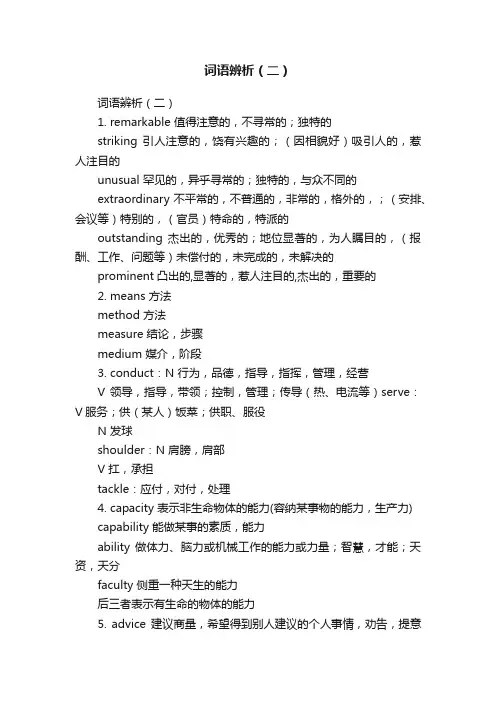
词语辨析(二)词语辨析(二)1. remarkable 值得注意的,不寻常的;独特的striking 引人注意的,饶有兴趣的;(因相貌好)吸引人的,惹人注目的unusual 罕见的,异乎寻常的;独特的,与众不同的extraordinary 不平常的,不普通的,非常的,格外的,;(安排、会议等)特别的,(官员)特命的,特派的outstanding 杰出的,优秀的;地位显著的,为人瞩目的,(报酬、工作、问题等)未偿付的,未完成的,未解决的prominent凸出的,显著的,惹人注目的,杰出的,重要的2. means 方法method 方法measure 结论,步骤medium 媒介,阶段3. conduct:N 行为,品德,指导,指挥,管理,经营V 领导,指导,带领;控制,管理;传导(热、电流等)serve:V服务;供(某人)饭菜;供职、服役N 发球shoulder:N 肩膀,肩部V 扛,承担tackle:应付,对付,处理4. capacity 表示非生命物体的能力(容纳某事物的能力,生产力)capability 能做某事的素质,能力ability 做体力、脑力或机械工作的能力或力量;智慧,才能;天资,天分faculty 侧重一种天生的能力后三者表示有生命的物体的能力5. advice 建议商量,希望得到别人建议的个人事情,劝告,提意见,可劝人为善或为恶suggest 建议,提出,表明隐含提出在某种情况下能够实现的事,提出某事来讨论protest 对……提出异议object 反对6. paradoxical 似乎矛盾的,似是而非的incompatible 不兼容的,不协调的7. feed 给(人或动物)食物raise 养育(孩子),饲养(家畜),生产(作物),提高,上升,养育enhance 增强,提高,美化(多用于抽象意义)8. proportion:(两件事物之间的)比,比例, 通常用于各种成分或分配额的比例等;percentage:百分比,百分率;rate:常用于表示速率,利率,出生率,死亡率,兑换率等;ratio:(表示两个数量之间关系的)比,比例, in direct/inverse ratio to 成正比/反比9. momentary 瞬息间的;prompt:(行动)立刻的,迅速的;instant:即刻发生的immediate:目前的,当前的10. exceeding:非常的,极度的excess:附加的,过量的,超额的11. some time一段时间sometimes有时some times将来或过去某时12. rare形容长期缺少从而珍贵的东西。
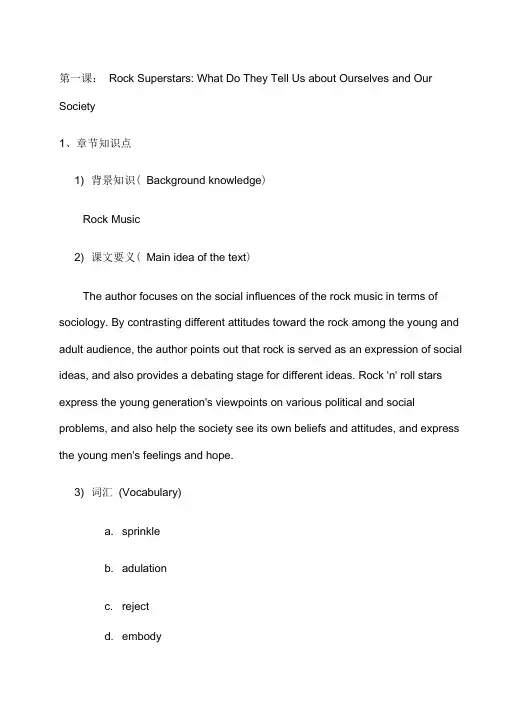
第一课:Rock Superstars: What Do They Tell Us about Ourselves and Our Society1、章节知识点1) 背景知识( Background knowledge)Rock Music2) 课文要义( Main idea of the text)The author focuses on the social influences of the rock music in terms of sociology. By contrasting different attitudes toward the rock among the young and adult audience, the author points out that rock is served as an expression of social ideas, and also provides a debating stage for different ideas. Rock 'n' roll stars express the young generation's viewpoints on various political and social problems, and also help the society see its own beliefs and attitudes, and express the young men's feelings and hope.3) 词汇(Vocabulary)a. sprinkleb. adulationc. rejectd. embodye. editorializef. bewildermentg. urgeh. drivei. celebratej. mirror4) 短语(Expressions)a. dressed in sthb. act outc. rather thand. sing ofe. in returnf. conceive of5) 词语辨析(Word analysis)a. adulation, admirationb. argue, debatec. arrogant, proudd. conceive, imaginee. confuse, bewilderf. ideal, idealisticg. mix, blendh. ramble, rumble6) 难句理解( Sentence comprehensio)na. They think he ' s sick, sick, sick.b. Horowitz sees the rock music arena as a sort of debating forum, a placewhere ideas clash and crash.c. Newspapers editorialized against him.d. Most of the older viewers frowned, while most of the younger viewersapplauded.e. He spoke of change and of the bewilderment of an older generation.f. The Beatles urged peace and piety.2、考核知识点本课文章中作者着重从社会学的角度探讨摇滚乐的社会意义。
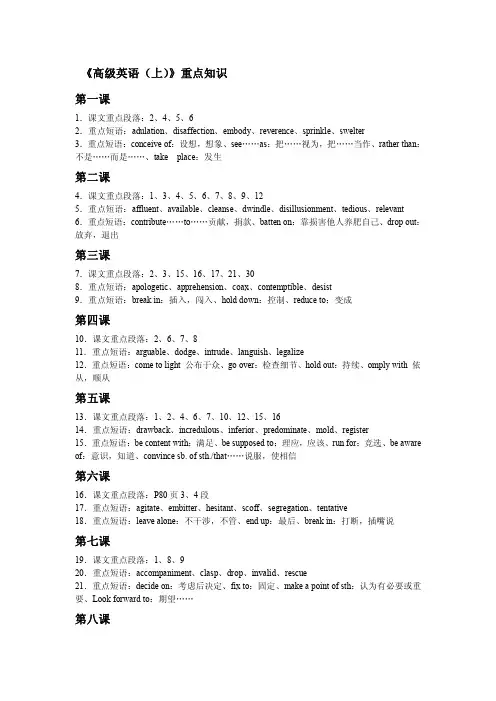
《高级英语(上)》重点知识第一课1.课文重点段落:2、4、5、62.重点短语:adulation、disaffection、embody、reverence、sprinkle、swelter3.重点短语:conceive of:设想,想象、see……as:把……视为,把……当作、rather than:不是……而是……、take place:发生第二课4.课文重点段落:1、3、4、5、6、7、8、9、125.重点短语:affluent、available、cleanse、dwindle、disillusionment、tedious、relevant 6.重点短语:contribute……to……贡献,捐款、batten on:靠损害他人养肥自己、drop out:放弃,退出第三课7.课文重点段落:2、3、15、16、17、21、308.重点短语:apologetic、apprehension、coax、contemptible、desist9.重点短语:break in:插入,闯入、hold down:控制、reduce to:变成第四课10.课文重点段落:2、6、7、811.重点短语:arguable、dodge、intrude、languish、legalize12.重点短语:come to light 公布于众、go over:检查细节、hold out:持续、omply with 依从,顺从第五课13.课文重点段落:1、2、4、6、7、10、12、15、1614.重点短语:drawback、incredulous、inferior、predominate、mold、register15.重点短语:be content with:满足、be supposed to:理应,应该、run for:竞选、be aware of:意识,知道、convince sb. of sth./that……说服,使相信第六课16.课文重点段落:P80页3、4段17.重点短语:agitate、embitter、hesitant、scoff、segregation、tentative18.重点短语:leave alone:不干涉,不管、end up:最后、break in:打断,插嘴说第七课19.课文重点段落:1、8、920.重点短语:accompaniment、clasp、drop、invalid、rescue21.重点短语:decide on:考虑后决定、fix to:固定、make a point of sth:认为有必要或重要、Look forward to:期望……第八课22.课文重点段落:P109页2、3、6段,P111页4段,P112页倒数第3段23.重点短语:couch、infuse、memorize、ruffle、sop、sophistication24.重点短语:.let alone:更不必说、appeal to:引起兴趣,吸引、have trouble (in) doing sth:做某事有困难、single out:挑选,选择第九课25.课文重点段落:1、226.重点短语:allot:、condense;、divert、surrender、miraculous27.重点短语:expose to: 暴露于、concentrate on:集中注意力、result in: 导致,带来、substitute for: 代替第十课30.课文重点段落:P140页倒数第三段,P141页倒数第一段31.重点短语:abrupt、compassionate、confirm、contemptuous、daunt、implore、overdo 32.重点短语:See through: 看穿、be bound to :一定,必须、in sth’s favour: 对……有利、in case: 万一、consent to :同意,允许第十一课33.课文重点段落:出最后以自然段外都是34.重点短语:crooked、eventful、inhuman、meditate、remonstrate、torment:35.重点短语:thanks to:由于,因为、be of no avail;无效;无用第十二课36.课文重点段落:1,P173页2段,37.重点短语:efface、compulsion、fluctuate:、outweigh38.重点短语:settle down:安顿,安定、get back: 补偿,恢复、for the sake of :为了、come up:出现第十三课39.课文重点段落:1、2、340.重点短语:actuate、impair、irk、outwit、actuate、procure、unmask:41.重点短语:be apt to do sth:易于,有……倾向的、apply to :适用、capable of :有能力,有可能、derive from:获得、by all means: 一定,必定、by any means: 无论如何第十四课42.课文重点段落:P203页最后1段,P205页第2段43.重点短语:distortion、dormant、glamorize、rampant、rationalize、distortion、revulsion 44.重点短语:be tantamount to: 等同于be guilty of: 对……有罪责in terms of :就……来说,在……方面pay homage to :表示敬意第十五课45.课文重点段落:2、346.重点短语:concede、diffusion、disharmony、expend、concede、indistinguishable、pronounced retrench47.重点短语:transform into:变为due to :由于regard as: 认为,把……看作turn out:证实,结果是第十六课48.课文重点段落:P244页第1段,P245页最后1段49.重点短语:composure、cordial、mandatory、season50.重点短语:in demand; 需求,受欢迎Owe sth. to sb.欠某人……,把……归功于……long for; 渴望take pride in: 对……感到自豪On behalf of:代表《高级英语(下)》重点知识第一课51.课文重点段落:P3页第2、3段,P5段3段,P6最后1段52.重点短语:bypass、distribution、monotony、motivate53.重点短语:in the long run:最终,终究, 从长远来看。
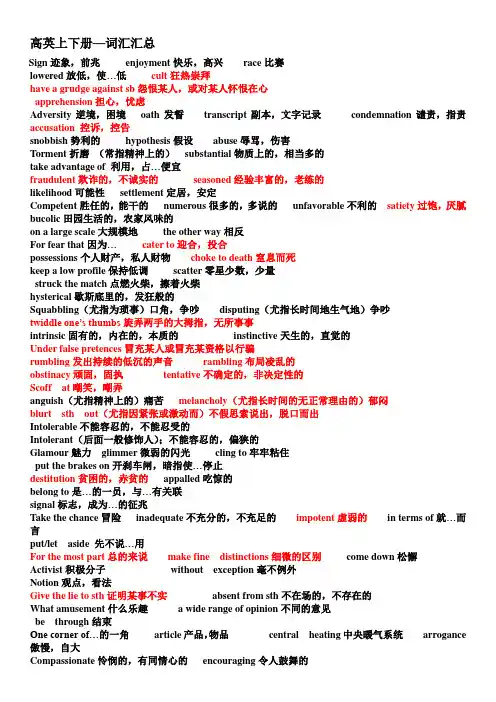
高英上下册—词汇汇总Sign迹象,前兆enjoyment快乐,高兴race比赛lowered放低,使…低cult狂热崇拜have a grudge against sb怨恨某人,或对某人怀恨在心apprehension担心,忧虑Adversity逆境,困境oath发誓transcript副本,文字记录condemnation谴责,指责accusation 控诉,控告snobbish势利的hypothesis假设abuse辱骂,伤害Torment折磨(常指精神上的)substantial物质上的,相当多的take advantage of 利用,占…便宜fraudulent欺诈的,不诚实的seasoned经验丰富的,老练的likelihood可能性settlement定居,安定Competent胜任的,能干的numerous很多的,多说的unfavorable不利的satiety过饱,厌腻bucolic田园生活的,农家风味的on a large scale大规模地the other way相反For fear that因为… cater to迎合,投合possessions个人财产,私人财物choke to death窒息而死keep a low profile保持低调scatter零星少数,少量struck the match点燃火柴,擦着火柴hysterical歇斯底里的,发狂般的Squabbling(尤指为琐事)口角,争吵disputing(尤指长时间地生气地)争吵twiddle one’s thumbs旋弄两手的大拇指,无所事事intrinsic固有的,内在的,本质的instinctive天生的,直觉的Under false pretences冒充某人或冒充某资格以行骗rumbling发出持续的低沉的声音rambling布局凌乱的obstinacy顽固,固执tentative不确定的,非决定性的Scoff at嘲笑,嘲弄anguish(尤指精神上的)痛苦melancholy(尤指长时间的无正常理由的)郁闷blurt sth out(尤指因紧张或激动而)不假思索说出,脱口而出Intolerable不能容忍的,不能忍受的Intolerant(后面一般修饰人);不能容忍的,偏狭的Glamour魅力glimmer微弱的闪光cling to牢牢粘住put the brakes on开刹车闸,暗指使…停止destitution贫困的,赤贫的appalled吃惊的belong to是…的一员,与…有关联signal标志,成为…的征兆Take the chance冒险inadequate不充分的,不充足的impotent虚弱的in terms of就…而言put/let aside 先不说…用For the most part总的来说make fine distinctions细微的区别come down松懈Activist积极分子without exception毫不例外Notion观点,看法Give the lie to sth证明某事不实absent from sth不在场的,不存在的What amusement什么乐趣 a wide range of opinion不同的意见be through结束One corner of…的一角article产品,物品central heating中央暖气系统arrogance 傲慢,自大Compassionate怜悯的,有同情心的encouraging令人鼓舞的hereditary遗传的coax哄劝,劝诱admonish责备,告诫miraculous不可思议的,神奇的incredulous不肯相信的,表示怀疑的preoccupy占据intrude侵入,打搅profoundly深远地,极大地Entrust 委托entrust sth to sb委托某人负责某物Extraordinary不平常的corresponding相符的,相当的pointless无意义的,无目标的Much of a…了不起的,很好的Excited激动的,兴奋的;主语常是有生命的人或动物For/because都表示原因,For表推测的原因;引导的句子前常用逗号隔开。
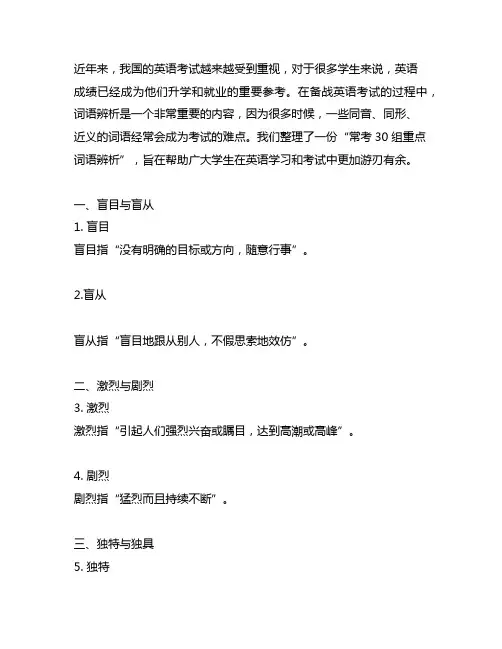
近年来,我国的英语考试越来越受到重视,对于很多学生来说,英语成绩已经成为他们升学和就业的重要参考。
在备战英语考试的过程中,词语辨析是一个非常重要的内容,因为很多时候,一些同音、同形、近义的词语经常会成为考试的难点。
我们整理了一份“常考30组重点词语辨析”,旨在帮助广大学生在英语学习和考试中更加游刃有余。
一、盲目与盲从1. 盲目盲目指“没有明确的目标或方向,随意行事”。
2.盲从盲从指“盲目地跟从别人,不假思索地效仿”。
二、激烈与剧烈3. 激烈激烈指“引起人们强烈兴奋或瞩目,达到高潮或高峰”。
4. 剧烈剧烈指“猛烈而且持续不断”。
三、独特与独具5. 独特独特指“只有一种,只有一个”。
6. 独具独具指“只属于某一个人或物”。
四、不可思议与难以置信7. 不可思议不可思议指“难以想象或理解”。
8. 难以置信难以置信指“难以相信、疑难”。
五、鲜明与明显9. 鲜明鲜明指“明亮、鲜艳,使人显得清楚”。
10. 明显明显指“表现得很清楚,容易看出来”。
六、赞成与支持11. 赞成赞成指“同意、认可”。
12. 支持支持指“支撑,拥护”。
七、运用与应用13. 运用运用指“接触、使用”。
14. 应用应用指“把知识和技术用于实际工作”。
八、索然无味与索然无趣15. 索然无味索然无味指“没有滋味”。
16. 索然无趣索然无趣指“无趣、没有意思”。
九、维持与保持17. 维持维持指“使保持在原点”。
18. 保持保持指“使持续”。
十、承认与认可19. 承认承认指“坦率地说出事实或真相”。
20. 认可认可指“同意、认同”。
十一、态度与意见21. 态度态度指“对人或事物的看法、立场”。
22. 意见意见指“对问题的认识和见解”。
十二、文明与文化23. 文明文明指“一定历史时期的物质和精神文化”。
24. 文化文化指“人类在社会历史发展过程中创造出的一切物质和精神文明成果”。
十三、充实与丰富25. 充实充实指“使充满、使成为丰富”。
26. 丰富丰富指“内容多、数量多、种类多”。
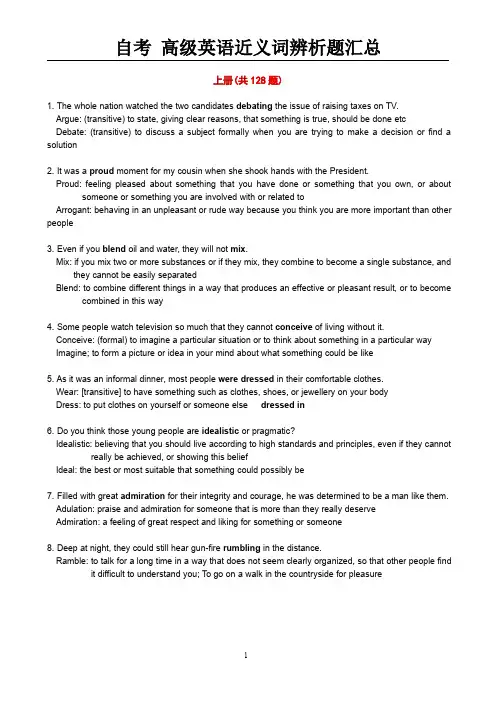
上册(共128题)1.The whole nation watched the two candidates debating the issue of raising taxes on TV.Argue:(transitive)to state,giving clear reasons,that something is true,should be done etcDebate:(transitive)to discuss a subject formally when you are trying to make a decision or find a solution2.It was a proud moment for my cousin when she shook hands with the President.Proud:feeling pleased about something that you have done or something that you own,or about someone or something you are involved with or related toArrogant:behaving in an unpleasant or rude way because you think you are more important than other people3.Even if you blend oil and water,they will not mix.Mix:if you mix two or more substances or if they mix,they combine to become a single substance,and they cannot be easily separatedBlend:to combine different things in a way that produces an effective or pleasant result,or to become combined in this way4.Some people watch television so much that they cannot conceive of living without it.Conceive:(formal)to imagine a particular situation or to think about something in a particular way Imagine;to form a picture or idea in your mind about what something could be like5.As it was an informal dinner,most people were dressed in their comfortable clothes.Wear:[transitive]to have something such as clothes,shoes,or jewellery on your bodyDress:to put clothes on yourself or someone else dressed in6.Do you think those young people are idealistic or pragmatic?Idealistic:believing that you should live according to high standards and principles,even if they cannot really be achieved,or showing this beliefIdeal:the best or most suitable that something could possibly be7.Filled with great admiration for their integrity and courage,he was determined to be a man like them. Adulation:praise and admiration for someone that is more than they really deserveAdmiration:a feeling of great respect and liking for something or someone8.Deep at night,they could still hear gun-fire rumbling in the distance.Ramble:to talk for a long time in a way that does not seem clearly organized,so that other people find it difficult to understand you;To go on a walk in the countryside for pleasureRumble:to make a series of long low sounds,especially a long distance away from you9.The professor looked over our papers with a hasty glance.Sight:the act of seeing somethingGlance:to quickly look at someone or something10.Before ordering their dinner,they considered the,relative merits of chicken and roast beef.Relevant:directly relating to the subject or problem being discussed or considered(强调与一方相关) Relative:having a particular quality when compared with something else(强调比较)11.the little boy’s constant noise exasperated his father,who was busy writing a paper for a symposium.Exhilarate:to make someone feel very excited and happyExasperate:to make someone very annoyed by continuing to do something that upsets them12.isn’t it noisome to live in a city with so many vehicles passing day and night?Wholesome:likely to make you healthyNoisome:very unpleasant13.He was born in a small town inhabited by about500people.Live:if you live in a place,you have your home thereInhabit:if animals or people inhabit an area or place,they live there14.Her desk was all cluttered with old papers,strings,and other odds and ends.Jumble:to mix things together in an untidy way,without any order(及物动词经常用于被动,不能作表语)Clutter:to cover or fill a space or room with too many things,so that it looks very untidy(与with搭配) odds and ends:small things of various kinds without much value(零星东西)15.He thinks they are extremely idealistic,for all their pragmatism.Idealistic,ideal:see number616.She made one last appeal to her father for permission to go to the party.Attraction:a feeling of liking someone,especially in a sexual way(强调双方相互吸引)Appeal:a quality that makes people like something or someone(强调一方吸引另一方)17.The girl looked at the doctor terrified.PS:形容人ED,形容事/物ING.Terrifyingly:extremely frightening;scary(表主动)Terrified:very frightened;scared(表被动)18.“If you finish all the homework tonight,we’ll go for a picnic tomorrow,”he coaxed.Admonish:(formal)to tell someone severely that they have done something wrongCoax:to persuade someone to do something that they do not want to do by talking to them in a kind, gentle,and patient way19.He thought their behavior was contemptible,but he didn’t say anything in front of the host.Contemptuous:showing that you think someone or something deserves no respectContemptible:not deserving any respect at all20.Summoned by the boss,he approached his office full of apprehension.Apprehension:anxiety about the future,especially about dealing with something unpleasant or difficult;anxietyDistrust:a feeling that you cannot trust someone21.He was sincerely sorry for what happened at the party,so people accepted his apology.Excuse:a reason that you give to explain careless or offensive behavior;a reason that you invent to explain an action and to hide your real intentionsApology:something that you say or write to show that you are sorry for doing something wrong22.They were walking in the forest when they heard a terrifying roar,which made their blood freeze.Terrifying:extremely frighteningTerrific:(informal)very good,especially in a way that makes you feel happy and excited;very large in size or degree(在尺寸和程度上很大)23.Obviously they were getting nowhere with the meeting,so he decided to desist from making a finaldecision that afternoon.Desist:(formal)to stop doing something(跟from搭配)Resist:to stop yourself from having something that you like very much or doing something that you want to do(后面直接加动名词)24.“How can you say that you don’t want to see your grandmother”the father admonished coaxed).Admonish,coax:see number1825.The warrior managed to dodge the arrow that came flying through the air.Evade:to avoid talking about something,especially because you are trying to hide something(避而不谈);to escape from someone who is trying to catch you(逃避)Dodge:to move quickly to avoid someone or something26.They speaker’s last few words were drowned out by the audience’s thunderous applauses.Drown out:if a loud noise drowns out another sound,it prevents it from being heardStop:prevent,not continue27.Would I be intruding if I joined in your discussion?Intrude:to interrupt someone or become involved in his or her private affairs in an annoying and unwanted wayInvade:to enter a country,town,or area using military force,in order to take control of it28.The omission of a full stop at the end of the sentence is a deliberate act by the writer.Omission:when you do not include or do not do somethingExclusion:when someone is not allowed to take part in something or enter a place29.The newly-recruited soldiers swore an oath of loyalty to their countryOath:a formal and very serious promisePromise:to tell someone that you will definitely do or provide something or that something will happen30.The suspect was accused of withholding some important evidence from the court.Prevent:to stop something from happening,or stop someone from doing somethingWithhold:to refuse to give someone something(隐瞒)31.Whether or not he is the best person for the promotion is arguable.Debatable:things that are debatable are not certain because people have different opinions about themArguable:not certain,or not definitely true or correct,and therefore easy to doubt32.He has established himself as a credible businessman.Credible:deserving or able to be believed or trusted(可形容人或事)Believable:something that is believable can be believed because it seems possible,likely,or real(只能形容事)33.His story of having discovered the treasure buried by some pirates seemed incredible to everyoneIncredible:too strange to be believed or very difficult to believeIncredulous:unable or unwilling to believe something34.“But the piano is out of tune”,she said in a disappointed tone.Tone:the way your voice sounds,which shows how you are feeling or what you meanTune:a series of musical notes that are played or sung and are nice to listen to35.Her friends expressed great sympathy to her when her mother died.Sympathy:the feeling of being sorry for someone who is in a bad situation(表具体)Empathy:the ability to understand other people's feelings and problems(表抽象)36.They are now enjoying a short vacation at the seashore.Vocation:the feeling that the purpose of your life is to do a particular type of work,especially because it allows you to help other people(尤指一种能够帮助他人的职业,比如说教师等) Vacation:a holiday,or time spent not working37.A t contented person is one who is happy with what he has.Content:happy and satisfied(因为别人的原因而使你感到满意)Contented:happy and satisfied because your life is good(因为自己的原因而使你感到满意)38.All the streets will be illuminated tomorrow evening for the celebration.Eliminate:to completely get rid of something that is unnecessary or unwanted(有除掉敌人或淘汰比赛对手意思)Illuminate:to make a light shine on something,or to fill a place with light(原意为照亮,另有阐明的意思)39.Her persistence in wearing that old-fashioned hat surprised her husband.Perseverance:determination to keep trying to achieve something in spite of difficulties(坚毅)Persistence:determination to do something even though it is difficult or other people oppose it(坚持或固执)40.The effect of the officer’s speech was such that the army recovered it’s morale at once.Moral:relating to the principles of what is right and wrong behavior,and with the difference between good and evil(道德)Morale:the level of confidence and positive feelings that people have,especially people who work together,who belong to the same team etc(士气)41.South Africa used to be a country where black people and white people were segregated.Separate:to divide or split into different parts,if something separates two places or two things,it is between them so that they are not touching each otherSegregate:to separate one group of people from others,especially because they are of a different race,sex,or religion(尤指种族隔离)42.The letter from her sister so agitated her that she stayed awake half the night,trying to think of a wayto get back at her.Embitter:angry,sad,or full of hate because of bad or unfair things that have happened to youAgitate:(formal)to make someone feel anxious,upset,and nervous(使不安,另有煽动的意思)Get back at sb.:to do something to hurt or harm someone who has hurt or harmed you43.You haven’t seen him for over a year?”he sounded incredulous.Incredible:too strange to be believed or very difficult to believe(表示一种怀疑的态度)Incredulous:unable or unwilling to believe something(表示虽然不愿相信但承认事实)44.No matter what he said,the only response he got from him was a noncommittal“I see”Noncommittal:deliberately not expressing your opinion or intentions clearly(不明朗的)Tentative:not definite or certain,and may be changed later(暂时,试验性的)45.That plan was too unrealistic to be adopted.Untrue:not based on facts that are correctUnrealistic:unrealistic ideas or hopes are not reasonable or sensible46.When people looked at him too(intently,tentatively),he felt very uncomfortable.Intently:giving careful attention to something so that you think about nothing elseTentatively:not definite or certain,and may be changed later(暂时,试验性的)47.Since she didn’t know anybody in that city,she was rather(hesitant,tentative)when accepting the job offer.Hesitant:uncertain about what to do or say because you are nervous or unwillingTentative:done without confidence(这是tentative的第二个意思)48.“Do you really think he will give up the position?”he(scoffed,scold).Scoff:to laugh at a person or idea,and talk about them in a way that shows you think they are stupid; make fun ofScold:to angrily criticize someone,especially a child,about something they have done49.She told the children about her life on the farm all those years ago,how she(got used to,used to) get up at four every morning to milk the cows.Get used to:to have experienced something so that it no longer seems surprising,difficult,strange etc Used to:if something used to happen,it happened regularly or all the time in the past,but does not happen now50.The teacher told the boys first to(pour,splash)some water on the floor before mopping it.Pour:to make a liquid or other substance flow out of or into a container by holding it at an angle Splash:to make someone or something wet with a lot of small drops of water or other liquid CF:sprinkle51.When he was discovered,the pick-pocket(waved,flapped)a knife to threaten the people around him.Wave:to raise your arm and move your hand from side to side in order to make someone notice youFlap:to move quickly up and down or from side to side,often making a noise52.The eagle suddenly(drifted,swooped)down and snatched the piece of meat.Drift:to move slowly on water or in the airSwoop:if a bird or aircraft swoops,it moves suddenly down through the air,especially in order to attack something53.With the help of the specially trained dogs,they were able to(rescue,save)ten people buried in the snow.Rescue:to save someone or something from a situation of danger or harm(强调营救的过程)Save:to make someone or something safe from danger,harm,or destruction(强调安全)54.His feet were numb with cold;as soon as he got into the room he started(rubbing,stroking)them vigorously.Rub:to move your hand,or something such as a cloth,backwards and forwards over a surface while pressing firmlyStroke:to move your hand gently over somethingNumb means unable to feel anything55.The kitchen floor has to be(scrubbed,scraped)every other day.Scrub:to rub something hard,especially with a stiff brush,in order to clean itScrape:to rub against a rough surface in a way that causes slight damage or injury,or to make something do this56.Every night before he went to bed,he(made a point,made a plan)of checking all the doors and windows.Made a point:to do something deliberately,even when it involves making a special effortMade a plan:plan to do something57.Students of English are required to(remember,memorize)the listed2000words.Remember:to have a picture or idea in your mind of people,events,places etc from the past Memorize:to learn words,music etc so that you know them perfectly58.You should not be(intolerable,intolerant)of different religious beliefs.Intolerable:too difficult,bad,annoying etc for you to accept or deal with(句子主语表示动作的对象) Intolerant:not willing to accept ways of thinking and behaving that are different from your own59.He tried to(infuse,fill)the awkward situation with humor.Infuse:(formal)to fill something or someone with a particular feeling or quality(表抽象)跟with搭配Fill:if a container or place fills,or if you fill it,enough of something goes into it to make it full(表具体)60.We have a sense of working towards a(common,ordinary)goal.Common:common aims,beliefs,ideas etc are shared by several people or groups(这是common特有的意思表示共同的)Ordinary:average,common,or usual,not different or special61.The virus can only be transmitted through(familiar,intimate)contact.Familiar:someone or something that is familiar is well-known to you and easy to recognizeIntimate:relating to sex(在本句中的意思);Private and friendly so that you feel comfortable62.It suddenly(happened,occurred)to him that he had worked for twelve hours without eating anything. Happen:if you happen to do something,you do it by chanceOccur:if an idea or thought occurs to you,it suddenly comes into your mind63.The students waited in(respectable,respectful)silence for the Noble Prize winner to make his speech.Respectable:someone who is respectable behaves in a way that is considered socially acceptable Respectful:feeling or showing respect64.The children suffer most when their parents(divide,separate).Divide:if something divides,or if you divide it,it separates into two or more partsSeparate:if two people who are married or have been living together separate,they start to live apart65.The teacher(allotted,divided)the children into several small groups for the trip to the Palace Museum.Allot:to use a particular amount of time for something,or give a particular share of money,space etc to someone or somethingDivide:if something divides,or if you divide it,it separates into two or more parts66.Around mid-night,she received a(mysterious,miraculous)phone call from someone she did not know of.Mysterious:mysterious events or situations are difficult to explain or understandMiraculous:very good,completely unexpected,and often very lucky67.Do you think soil samples are(obtainable,absorbable)from the Mars by an unmanned aircraft in the near future?Obtainable:able to be obtainedAbsorbable:可吸收的,容易吸收的68.She was so dear to him that he still kept her picture in a(preeminent,prominent)position on hisdesk.Preeminent:优秀超群的Prominent:something that is in a prominent place is easily seen69.Soft background music will(enhance,increase)a delicious meal.Enhance:to improve somethingIncrease:if you increase something,or if it increases,it becomes bigger in amount,number,or degree 70.He was so disappointed when the manager said that his plan was completely(dismissible, disposable).Dismissible:not deserving to be consideredDisposable:intended to be used once or for a short time and then thrown(一次性)available to be used(可再生的)71.The baby-sitter kept the kids(accompanied,company)until we got back from the theater. Accompany:to go somewhere with someoneCompany:固定搭配keep…company=be with her so that she doesn't feel lonely与谁做伴72.Will the financial(reverse,adverse)prevent you from taking a holiday this summer?Reverse:the exact opposite of what has just been mentionedAdverse:not good or favorable73.The(distribution,allotment)of funds to these universities is decided by the Ministry of Education. Distribution:the act of sharing things among a large group of people in a planned way(普通的分配) Allotment:an amount or share of something such as money or time that is given to someone or something,or the process of doing this(尤指上下级之间的分配)74.The employees are openly(contemptuous,contemptible)of their corrupt manager. Contemptuous,Contemptible:see number1975.The gardener was asked to cut the bushes(even,equal)with the fence.Even:flat and level,with no parts that are higher than other parts(作形容词表示与持平的)Equal:the same in size,number,amount,value etc as something else76.His handwriting was so tiny that it was hardly(readable,legible).Readable:interesting and enjoyable to read,and easy to understand(因有趣味而可读的)Legible:written or printed clearly enough for you to read(因书写印刷清晰而可读的)77.The(shameful,shameless)family secret was brought to light.Shameful:shameful behavior or actions are so bad that someone should feel ashamed(形容行动或事件) Shameless:not seeming to be ashamed of your bad behavior although other people think you should beashamed(只能形容人)78.The bus came to a(quick,abrupt)stop,and some passengers lost their balance.Quick:lasting for or taking only a short timeAbrupt:sudden and unexpected79.Mary aired her(grievances,grief)at not being treated fairly by the salesperson.Grievances:a belief that you have been treated unfairly,or an unfair situation or event that affects and upsets you(委屈,冤情)Grief:extreme sadness,especially because someone you love has died80.He felt(daunted,discouraged)by the enormous difficulties involved in completing the construction of the airport in one year.Daunt:to make someone feel afraid or less confident about somethingDiscouraged:no longer having the confidence you need to continue doing something81.There is a(contrariness,contradiction)between what he says and what he does.Contrariness:someone who is contrary deliberately does different things from other people(contrary特有的意思)Contradiction:a difference between two statements,beliefs,or ideas about something that means they cannot both be true82.It was in the(dark,dim)light of the early dawn that I saw a man moving towards me.Dark:if it is dark,there is little or no lightDim:fairly dark or not giving much light,so that you cannot see well83.The poor,sick man is(abused,tormented)by the policeman’s endless interrogation.Abuse:to treat someone in a cruel and violent way,often sexually(虐待尤指性方面的);to deliberately use something for the wrong purpose or for your own advantage(滥用)Torment:to make someone suffer a lot,especially mentallyInterrogate:to ask someone a lot of questions for a long time in order to get information,sometimes using threats84.Too much food(induces,tempts)sleepiness.Induce:(formal)to persuade someone to do something,especially something that does not seem wise; formal to cause a particular physical condition(这是本句的意思)Tempt:to try to persuade someone to do something by making it seem attractive;85.He(wondered,mediated)for a whole week before making that important decision.Wonder:to think about something that you are not sure about and try to guess what is true,what willhappen etcMediate:to try to end a quarrel between two people,groups,countries etc(在本句中表示思量考虑)86.A(n)(literal,exact)translation is not always the best.Literal translation:a translation that translates each word exactly instead of giving the general meaning in a more natural wayExact:completely correct in every detail87.The author declares that the plot and characters of the novel are(imaginary,imaginative). Imaginary:not real,but produced from pictures or ideas in your mind(虚拟的,虚构的)Imaginative:containing new and interesting ideas or good at thinking of new and interesting ideas(富于想象的,爱想象的)CF imaginable:used to emphasize that something includes every possible example of something(可以想象到的)88.We walked for miles along the(twisted,crooked)path in the forest.Twisted:something twisted has been bent in many directions or turned many times,so that it has lost its original shapeCrooked:bent,twisted,or not in a straight line89.We advise girls below twenty not to marry,because they are still emotionally(naive,immature). Naive:not having much experience of how complicated life is,so that you trust people too much and believe that good things will always happenImmature:someone who is immature behaves or thinks in a way that is typical of someone much younger-used to show disapproval90.Her feelings(fluctuated,changed)between excitement and fear.Fluctuate:if a price or amount fluctuates,it keeps changing and becoming higher and lower(与WITH搭配)Change:to become different,or to make something become different91.The police will not hesitate to use(force,compulsion)if they bank robbers still refuse to surrender. Force:violent physical action used to get what you wantCompulsion:a strong and unreasonable desire to do something92.After twenty years of antagonism,the two countries were finally(reconciled,friendly).Reconcile:if you reconcile two ideas,situations,or facts,you find a way in which they can both be true or acceptable(和解)Friendly:behaving towards someone in a way that shows you like them and are ready to talk to them or help them93.To call the air strikes against Yugoslavia peace-keeping is a(downright,thorough)lie.Downright:used to emphasize that something is completely bad or untrueThorough:including every possible detail94.“As red as blood”is a(metaphor,simile)Metaphor:a way of describing something by referring to it as something different and suggesting that it has similar qualities to that thing(隐喻)Simile:an expression that describes something by comparing it with something else,using the words'as' or'like',for example'as white as snow(明喻)95.The sight of the snake gave me the(trembling,shivers).Trembling:shaking slightly in a way that you cannot control,especially because you are upset or frightenedShiver:give sb.The shivers=informal to make you feel afraid(固定搭配,除此以外trembling和shiver同义词)96.Although the children found the fables most(readable,understandable),they sometimes missed the messages of the stories.Readable:见No.76Understandable:seem normal and reasonable because of the situation you are in97.The office buildings with their(desirable,desired)locations are very much in demand.Desirable:something that is desirable is worth having or doing(正式用法)Desired:to want to have sex with someone(文学上特指这个意思)98.Driving after drinking Whiskey(is about,is apt)to cause traffic accidents.Be about to:if someone is about to do something,or if something is about to happen,they will do it or it will happen very soonBe apt to:to have a natural tendency to do something99.I don’t want the(actual,literal)meaning of the word,I’m asking you its figurative sense here. Actual:used to emphasize that something is real or exact(强调确切的,事实的);used to introduce the most important part of an event or activity(强调实质上的)Literal:the literal meaning of a word or expression is its basic or original meaning100.In that part of the world the summer weather is so(varied,variable)that even when the sun is shining brightly you never can be sure if it is going to rain in an hour’s time.Varied:consisting of or including many different kinds of things or people,especially in a way that seems interestingVariable:likely to change often101.He said he would go to the dress rehearsal,(unless,provided)he was not too busy.Unless:used to say that something will happen or be true if something else does not happen or is not trueProvided that:used to say that something will only be possible if something else happens or is done102.Something has been wrong with their marriage for a long time,although she makes(pretenses, excuse)that it is not.Pretense:a way of behaving which is intended to make people believe something that are not true Excuse:to be or give a good reason for someone's careless or offensive behavior两者的区别在于:前者表示事实上是错的,而在主观上去让别人相信是对的,后者表示对于自己所作所为进行的辩解,而别人并不清楚事实上是对是错.103.The Suzhou Style embroidery(requires,acquires)very exquisite skills.Requires:if you are required to do or have something,a law or rule says you must do it or have it Acquires:to obtain something by buying it or being given it104.A lot of retired people play chess to(kill,spend)time.Kill time:to spend time doing something which is not important while you are waiting to do something important or waiting for something else to happen(固定搭配)(强调事情的不重要性)Spend:to use time doing a particular thing or pass time in a particular place(不论事情的重要性)105.He knows that his parents have to work very hard in order to provide for his education,so he never (spends,squanders)money.Spend:to use your money to pay for goods or servicesSquander:to carelessly waste money,time,opportunities etc106.He wanted a(transcript,manuscript)of the report to show to his friends.Transcript:a written or printed copy of a speech,conversation etc(打印稿,手抄稿,强调可以复制成多份) Manuscript:a book or piece of writing before it is printed(手稿,原稿,强调只有一份)107.The workers were filled with(indignity,indignation)when they discovered that they were secretly watched during working hours.Indignity:a situation that makes you feel very ashamed and not respectedIndignation:feelings of anger and surprise because you feel insulted or unfairly treated108.People should(clean,purge)their minds of too strong a desire for money.Clean:to remove dirt from something by rubbing or washing(指清洁物质世界的东西)Purge:(literary)to remove bad feelings(专指净化,清除思想上的东西)。
词汇(Vocabulary)Bazaar (n.) : (in Oriental countries)a market or street of shops andstalls(东方国家的)市场,集市cavern (n.) : a cave,esp.a large cave洞穴,山洞(尤指大洞穴,大山洞) shadowy (adj.) : dim;indistinct模糊的;朦胧的FONT style="BACKGROUND-COLOR: cornflowerblue"color=white>harmonious (adj.) : having musical tones combined to give a pleasing effect;consonant(音调)和谐的,悦耳的/harmoniously adv. throng (n.) :a great number of people gathered together;crowd人群;群集conceivable (adj.) : that can be conceived,imagined 可想象的,想得到的din (n.) : a loud,continuous noise喧闹声,嘈杂声would-be ( adj.) : intended to be预期成为……的;将要成为……的muted (adj.) : (of a sound)made softer than is usual(声音)减弱的vaulted ( adj.) : having the form of a vault;arched穹窿形的;拱形的-sepulchral(n.) : a cave,esp.a large cave洞穴,山洞(尤指大洞穴,大山洞)shadowy (adj.) : suggestive of the grave or burial;dismal;gloomy坟墓般的;阴森森的guild ( n.) : any association for mutual aid and the promotion of common interests互助会;协会trestle (n.) :a frame consising of a horizontal beam fastened to two pairs of spreading legs,used to support planks to form a table,platform,etc.支架;脚手台架;搁凳impinge (v.) : strike,hit,or dash;have an effect撞击,冲击,冲撞;对……具有影响fairyland (n.) : the imaginary land where the fairies live;a lovely enchanting place仙境;奇境burnish ( v.) : make or become shiny by rubbing;polish擦亮;磨光;抛光brazier ( n.) : a metal pan,bowl,etc.,to hold burning coals or charcoal,as for warming a room or grilling food火盆;火钵dim ( v.) :make or grow unclear(使)变暗淡;(使)变模糊rhythmic /rhythmical ( adj.) :having rhythm有韵律的;有节奏的/rhythmically advbellows ( n.) :(sing.&p1.)a device that produces a stream of air through a narrow tube when its sides are pressed together(used for blowing fires,etc.)(单复同)风箱intricate ( adj.) :complex;hard to follow or understand because full of puzzling parts,details,or relationships;full of elaborate detail错综复杂的;精心制作的exotic ( adj.) :strange or different in a way that is striking or fascinating 奇异的;异常迷人的词汇(Vocabulary)reportorial ( adj.) :reporting报道的,报告的kimono ( n.) :a loose out garment with short,wide sleeve and a sash。
英语词汇辨析方法词汇辨析是学习英语的重要环节之一。
在学习和使用词汇时,我们经常会遇到一些容易混淆的词汇,这就需要我们具备准确辨析的能力。
本文将介绍几种常用的英语词汇辨析方法,帮助读者更好地掌握词汇的正确用法。
一、上下文辨析法上下文辨析法是通过理解句子的整体语境,结合词汇的意义和用法来推测词义。
在遇到生词或不熟悉的词汇时,我们可以通过仔细阅读上下文,在全面了解句子含义的基础上,进行词义的推测。
例如,在下面这个句子中:"He is a professional comedian and his jokes are always full of humor."我们可以通过理解整句的意思,结合后面的“jokes are always full of humor”来推测出“humor”是指“幽默”。
二、词根词缀辨析法词根词缀辨析法主要通过词根和词缀的含义来辨析词汇。
英语中有很多共享相同词根或词缀的词汇,通过掌握它们的基本含义,可以辨析出不同词汇之间的差异。
例如,“-able”和“-ible”都表示“能够”的意思,但“-able”通常用于形容词后缀,如“adaptable”(适应的),而“-ible”通常用于名词后缀,如“flexible”(灵活的)。
三、词义对比法词义对比法是通过比较相似词汇的不同之处来辨析词义。
相似的词汇往往只有细微的差别,我们需要仔细观察这些差别从而准确使用词汇。
例如,“big”和“large”都表示“大的”,但“big”更侧重于尺寸的大小,而“large”更偏向于数量或规模的大。
四、语法结构辨析法语法结构辨析法是通过词汇所在的语法结构来辨析词义。
英语中不同的词汇常常会出现在不同的语法结构中。
我们可以通过理解句子的语法结构,推测出词汇的意义。
例如,“look forward to”是一个固定搭配,意思是“期待”,而“look at”则表示“看”。
五、熟词生义辨析法熟词生义辨析法是指通过熟悉的词汇的新意义来辨析其他词汇。
高级英语词汇区别总结1. mix blendMix: 意为多种成分的混合,各构成成分失去自身的存在Blend: 指可和谐共存的事物的混合Oil and water do not mix.These two colors blend well.2. rambling rumblingRambling: 指(建筑物、街道)布局零乱的。
Rumbling: 指发生隆隆声There are some rambling houses.Listen! There is gun-fire rumbling in the distance.3. relevant relativeRelevant: 意为切题的、恰当的、有重大关系的、有意义的逻辑联系 Relative: 着意于一物受他物影响而产生的依赖的关系。
The witness’s testimony is not relevant to the case.Market values are always relative to the demand.4. exhilarate exasperateExhilarate: 意为使高兴Exasperate: 激怒,使烦恼。
I was exhilarated by her visit.I was exasperated by all the noise.5. jumble clutterJumble: 指不相同的东西混合在一起,混杂;Clutter: 指许多物品堆挤在一起,散乱,杂乱。
His thoughts were all jumbled.His desk is always cluttered.6. terrified terrifyingTerrified: 意味着一种被恐惧镇住的紧张心情;Terrifying: 指(声音、现象)本身具有令人恐怖的因素。
The terrified mother watched the dog attack her child.What a terrifying voice.7. contemptuous contemptibleContemptuous: 指认为某物或某人卑鄙、无耻或毫无价值,并实际上也把这种看法表现出来,轻蔑,侮辱Contemptible: 指任何能引起鄙视或嘲笑的事物,往往指首先或行为准则。
考点精析Lesson one Rock Superstars : What do they tell us about ourselves and our society ?#Sprinkling its contents over the first few rows of sweltering listeners.sprinkle v. to scatter in drops or small grains 喷/洒/撒eg: Sprinkle sand along the icy path . 把沙子撒在冰封的路上.#They surge to follow him ,eager to be touched by a few baptismal drops .surge v. to move ,esp。
forward ,in or like powerful waves 汹涌,澎湃eg: The crowd surged past him . 人潮从他身边汹涌而过。
n。
strong,wavelike ,forward movement 波涛,巨浪eg: The surge crashed against the coast 。
汹涌的波涛拍打着海岸.#How do you feel about all this adulation and hero worship ?adulation n。
praise that is more than necessary or deserved 奉承,谄媚eg:He received many adulations from his colleagues .他受到许多同事的奉承。
adulate v. praise more than is truthful to win favor 奉承,逢迎eg:The leader are easily adulated 。
Rock Superstarsadulation: excessive admiration or praise, flattery 奉承He received adulations from many people. 他受到许多人的奉承。
admiration: feeling of respect, warm approval 钦佩,佩服She was filled with admiration for his courage. 她对他的勇气充满敬意。
---------------------------------------------------------------------argue: give reasons for or against sth. esp. with the aim ofpersuading sb. 争论The lawyers argued the case for hours. 律师们对这个案子辩论了几个小时。
debate: formally argue, esp. defend one’s position and attack his opponent’s point of view 辩论The House of Representatives debated the proposal forthree days. 众议院就这个提案辩论了三天。
---------------------------------------------------------------------arrogant: showing too much pride in oneself and too little consideration for others 傲慢It’s arrogant of you to assume you’ll win every time. 你自以为每次都能赢,未免太自大了。
第1 课1.destroy一词最为常见,主要强调破坏的力度之大和彻底,一般不带感情或修辞色彩。
demolish和raze通常用于巨大物体,如大型建筑物等。
demolish常用引申义,指任何复合体的被毁,如demolish a theory with a few incisive comments。
意即“用几句锋利的评语推翻某种理论”。
而raze几乎无一例外地用于指建筑物的被毁。
annihilate在这些词中所表示的损坏程度最为强烈,字面意思是“化为乌有”,但实际上往往用于指对人或物的严重损伤。
如说annihilate an enemy force,是指使敌军遭到重创,不仅没有还手之力。
而且没有招架之功。
如说annihilate one’s opponent in a debate,是指彻底驳倒对手。
2. decay常指某物自然而然地逐渐衰败腐化。
如:His teeth have begun to decay.(他的牙齿开始老化变坏。
)rot指有机物质,如蔬菜等因菌毒感染而腐败变质,如:rotting apples(烂了的苹果)。
spoil用于非正式文体,常指食物变质。
如:Fish spoils quickly in summer。
(鱼在夏天极易变质。
)molder用于指物体缓慢、逐步地腐朽。
如:Old buildings molder away.(老房子渐渐腐烂了。
)disintegrate意指把某物从整体变为碎片或一个个部分。
如:rocks disintegrated by frost and rain(被霜和雨蚀裂成碎块的岩石)。
decompose指将物质分解为其构成成分。
如:Water can be decomposed(be decomposed)into hydrogen and oxygen.(水可分解成氧和氧。
)该词还可用来替代rot,使语气略显委婉。
在给出答案之前,首先将该题中的几个语法术语解释一下。
词语辨析lesson 1 Rock Superstarsadulation, admirationadulation: excessive admiration or praise, flattery 奉承He received adulations from many people. 他受到许多人的奉承。
admiration: feeling of respect, warm approval 钦佩,佩服She was filled with admiration for his courage. 她对他的勇气充满敬意。
---------------------------------------------------------------------argue, debateargue: give reasons for or against sth. esp. with the aim ofpersuading sb. 争论The lawyers argued the case for hours. 律师们对这个案子辩论了几个小时。
debate: formally argue, esp. defend one’s position and attack his opponent’s point of view 辩论The House of Representatives debated the proposal forthree days. 众议院就这个提案辩论了三天。
---------------------------------------------------------------------arrogant, proudarrogant: showing too much pride in oneself and too littleconsideration for others 傲慢It’s arrogant of you to assume you’ll win every time. 你自以为每次都能赢,未免太自大了。
proud: feeling or showing just or reasonable pride 骄傲We are proud of our country. 我们为祖国感到骄傲。
---------------------------------------------------------------------conceive, imagineconceive: form an idea, plan, etc. in the mind, often used inthe phrase “conceive of sth.”想到The ancients conceived (of) the world as flat. 古人认为地球是扁的。
imagine: form a mental ..\image of sth. 想象Can you imagine what it would be like to live withoutelectricity? 你能想象出生活中没有电会是一幅什么样的情景吗?---------------------------------------------------------------------confuse, bewilderconfuse: make sb. unable to think or act clearly 使……糊涂They confused me by asking so many questions. 他们提了一大堆问题,把我都弄糊涂了。
bewilder: confuse, esp. by the presence of many different or complicated things at the same time 因太复杂而使……不知所措,糊涂I was totally bewildered by the clues to this crosswordpuzzle. 这个纵横字谜的提示完全把我弄糊涂了。
---------------------------------------------------------------------ideal, idealisticideal: satisfying one’s idea of what is perfect, most suitable, unrealistic 理想的,不切实际的It is the ideal weather for a holiday. 这是度假的理想天气。
These are ideal plans for reform. 这些都是不切实际的改革计划。
idealistic: of idealism or of person who has high ideals 理想主义的,理想主义者的He is too idealistic as a politician. 作为政治家,他太理想主义了。
---------------------------------------------------------------------mix, blendmix: put together tow or more things to make sth. else 混合You mix flour and water to make paste. 你把面粉与水和在一起,调制成面糊。
blend: mix thoroughly 融合Blend blue and yellow, and you’ll get green. 把蓝色和黄色混合,就可以得到绿色。
---------------------------------------------------------------------ramble, rumbleramble: walk for pleasure with no special destination 漫步,散步I like rambling in the country. 我喜欢在乡间漫步。
rumble: make a deep heavy continuous sound 发出隆隆声I heard thunder rumbling in the distance. 我听见远方雷声隆隆。
---------------------------------------------------------------------Four Choices for Yong People词语辨析(Word analysis)sight, glancesight: n. ability to see; action of seeing 视力;看见Some drugs can affect your sight. 有些药物会影响视力。
Their first sight of land came after ten days at sea. 他们在海上十天之后首次看到陆地。
glance: n. quick look 一瞥She walked off without a glance in my direction. 她扬长而去,都不朝我这儿看一眼。
---------------------------------------------------------------------relevant, relativerelevant: connected with what is being discussed, what ishappening, what is being done 有关的,切题的the facts relevant to the case 与案件有关的事实I don’t think his remarks are relevant to our discussion. 我认为他的话不切我们的议题。
relative: having a connection with sth; referring to sth.与某事有关的,涉及某事的the facts relative to the problem与问题有关的事实Keep your comments relative to what is under discussion. 把你的发言集中在正在讨论的问题上。
区别:relevant 可用作定语,如:a highly relevant suggestion 密切相关的建议, relative 作定语只用于语法术语,如:a relativepronoun 关系代词---------------------------------------------------------------------exasperate, exhiarateexasperate: irritate or annoy (sb.) greatly 激怒,恼怒That child exasperated me. 那孩子让我很生气。
She was exasperated at / by his stupidity. 她因为他愚笨而发怒。
exhilarate: make sb. feel very happy or lively 使人愉快或活跃We felt exhilarated by our walk along the beach. 我们沿着海滩散步感到心旷神怡。
---------------------------------------------------------------------noisome, noisynoisome: offensive, disgusting 令人不快的,令人讨厌的They are most noisome politicians of that century. 他们是那个世纪最令人厌恶的政客。
noisy: full of noise 喧闹的,嘈杂的I can’t work in here ---- it’s far too noisy. 我无法在这里工作,太吵了。
---------------------------------------------------------------------live, inhabitlive: vi. make one’s home 居住,住live at home, in London, in a flat 住在家中,伦敦,公寓inhabit: vt. live in, occupy 居住于,占据He inhabited a small two-room flat. 他住在一套两室的小公寓里。